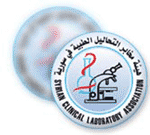The decision of the Syrian Laboratory Association for reissuing the Journal of Clinical Laboratory is brave... Nowadays in our fast living world, the traditional concepts of printing journals and textbooks are more and more replaced by the electronic media considered to be more accurate and faster in communicating new information. For receiving or searching new information in a certain area this is certainly true. In contrast, printed media are more definitive, more accurate and less exposed to any kind of changes or manipulation. Historic documents written centuries ago are still readable nowadays, reflecting more the individual character of the writer and the cultural background of the period. Certainly, the combination of electronic and paper publications with their different merits will be the future.
Advances in biomedical science and communication technology during the last decades have created new expectations in healthcare, in service and among healthcare professionals. Arrival of more accurate information has increased an individual's responsibility to his own health as well as to that of the general public. In this changing environment, the traditional concept of Clinical Chemistry and Laboratory Medicine moves toward patient care and health; laboratory professionals are met more and more with prevention, detection and monitoring of diseases and treatments. The increasing number of clinical tests and the complexity of data from investigating normal and abnormal gene forms and their expressions will force us to manage and interpret these observations through bio-informatic tools and to share our knowledge with clinicians. Accepting this challenge, laboratory professionals will gain new competency and responsibility, becoming progressively valuable partners to patients and clinicians. These changes also stress the need for continuous training and education within a discipline. A regional journal addressing these needs in a geographic and cultural way is pertinent for improvement of our discipline.
In the context of the Syrian's Laboratory Association history, serving the regional network of clinical chemists and laboratory physicians, it is evident that this Association continues to stimulate developments in standardization, in interpretation of laboratory test results, and new concepts in bio-sciences and technologies. This will certainly have an impact in the contents of the new Journal of Clinical Laboratory. It is anticipated that the journal will enable clinical laboratories to operate efficiently, furnishing a high standard of professional and technical competence. As this new century unfolds and life expectancies increase, health is becoming one of the fastest growing social and economic concerns. With more information available, patient demand will increase. In response to this demand, we must not however lose sight of essential humane values, as not all citizens have the same access to basic health care information and services. The editors of the multilingual Journal of Clinical Laboratory have taken the large responsibility and task on their shoulders to publish a modern regional journal. Their enthusiasm is welcomed, certainly will be honored by the readers and will improve the quality of Laboratory Medicine in the region disseminating thorough and accurate information that society and professionals can rust. |
